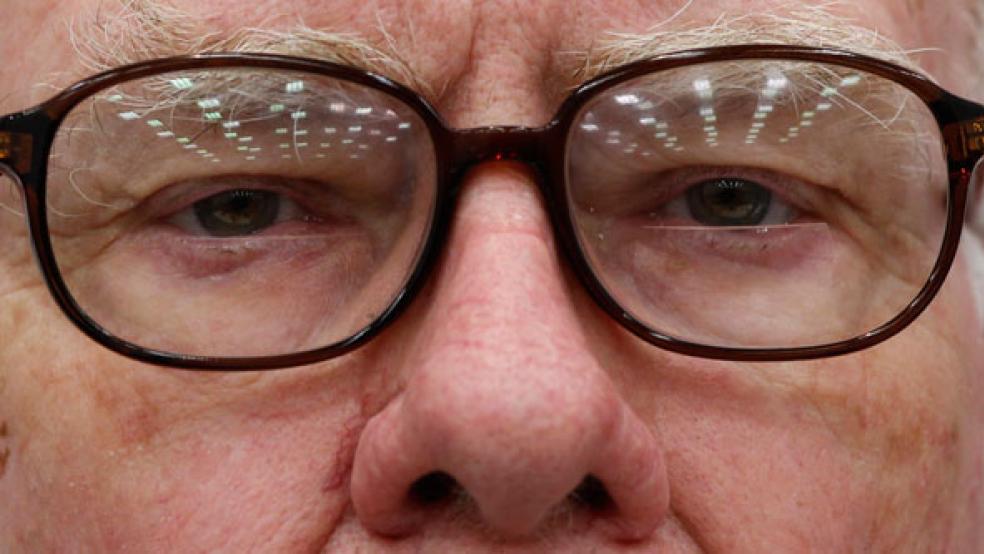Warren Buffett on Saturday gave the most extensive comments to date about the future of Berkshire Hathaway Inc after he is gone, saying he still expects the conglomerate to be a partner of choice for distressed companies.
Buffett, 82, also defended his plan to install his son, Howard, who has little investing experience, as nonexecutive chairman, saying the younger man’s role would be to ensure that Berkshire had the right CEO in place.

During the financial crisis and its immediate aftermath, Berkshire helped prop up a number of companies, among them blue-chips such as General Electric and Goldman Sachs. Buffett’s investments were viewed by many shareholders as a seal of approval from one of the world’s most respected businessmen.
RELATED: As Berkshire Grows, Warren Buffett Faces Big Questions
Short-seller Doug Kass, invited by Buffett to Berkshire’s annual meeting on Saturday to offer contrarian points of view, asked whether a successor would have the same heft. Buffett said it would not matter. "Berkshire is the 800 number when there is really some panic in the markets, and people really need significant capital," Buffett said. "If you come to a day when the Dow has fallen 1,000 points a day for a few days and the tide has gone out and you find some naked swimmers, those naked swimmers … will call Berkshire," he added.
Whoever ultimately takes over Berkshire will run a conglomerate that employs more than 280,000 people in dozens of businesses worldwide, covering everything from ice cream to insurance and retail to railroads. Kass later asked what qualified Howard Buffett, a 58-year-old farmer and philanthropist, to step in as Berkshire’s non-executive chairman when his father is gone. The elder Buffett insisted his son was ideal for the task at hand.
"He has no illusions at all of running the business. He won’t get paid for running the business," Buffett said. "He’ll only have to think about whether the board … needs to change the CEO."
As in the past, Buffett talked about his successor as CEO without actually identifying him. Speculation usually focuses on a small group of top Berkshire executives, among them insurance boss Ajit Jain and railroad leader Matt Rose.
One long-time Buffett-watcher said the legendary investor seemed to handle the pressure from Kass and others well. "Buffett hasn’t broken much new ground, but he’s handled Doug’s question well … and, as always, reinforced the Berkshire culture every chance he’s had," said Jeff Matthews, founder of hedge fund Ram Partners LP and a Buffett biographer.
Berkshire’s breadth means that its performance is seen as a barometer for the broader economy. On Saturday, Buffett said he still stands by the actions taken by the U.S. Federal Reserve to stimulate the economy, even as he cautioned that the program could be "very inflationary."
"This is like watching a good movie, and I do not know the end," he said. "We have benefited significantly, and the country has benefited significantly, by what the Fed has done."
Buffett also endorsed the last four years of deficit spending by President Obama’s administration, saying it is a problem to get off that program but much less of a problem than if the government had followed a strict austerity program instead. "We are seeing some recovery in housing prices which has psychological effects," he said. "(By the next annual meeting) I think we will have moved forward … I don’t think there will be a surge of any sort, but I don’t think we will stall."
Earlier Saturday, one of Buffett’s top lieutenants said things were picking up but could improve further. "It feels like a 2 percent economy. If we want to see GDP click up to 3.5 percent, 4 percent, you need to see more consumption," said Rose, CEO of the railroad Burlington Northern, in an interview.Rose said Burlington Northern was seeing "across the board" increases in demand to ship things like concrete, roofing tiles and cars.
Buffett may be optimistic about the economy, but he is decidedly more cautious about technology. Earlier this week he joined Twitter, taking the handle @WarrenBuffett – but insisted he only knew enough about it to press a button when told to.
On Saturday he said he disagreed with the recent guidance from the U.S. Securities & Exchange Commission that lets companies release material information on Twitter. Some see that as a threat to Berkshire’s press release service, Business Wire. "The key to disclosure is accuracy and simultaneity … I do not want it, if I am buying Wells Fargo, to keep hitting up their web page and hoping I’m not 10 seconds behind someone else for some important announcement," he said.
He also stuck by one of Berkshire’s more controversial investments, its recent acquisition of a number of newspapers. The annual meeting crowd applauded when CNBC anchor Andrew Ross Sorkin asked a critical question about the stable of papers. "It’s not going to move the needle in Berkshire … we are buying the papers at very, very low prices with (regard to) current earnings," Buffett said, adding that he expected to meet or beat a 10 percent rate of return, after-tax.
Yet as much as investors want to hear about Berkshire’s growth potential and the state of the economy, some also attend the meeting just for a good laugh. The meeting opened, as it does every year, with a video montage. This year’s included a duet between Buffett and singer Jon Bon Jovi and a take-off on the TV series "Breaking Bad." Some of the best comedy, though, usually comes in the verbal sparring between Buffett and Vice Chairman Charlie Munger over the course of the day. The two are close – they shared an oversize box of peanut brittle during the meeting – but Munger’s acerbic tongue pops out from time to time. "I come to see Charlie Munger needle Warren Buffett – only he can," said Sherman Silber, a doctor and shareholder.




